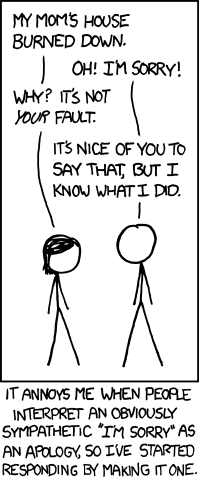945: I'm Sorry
| I'm Sorry |
 Title text: You know I've always hated her. |
Explanation[edit]
The term "I'm sorry" expresses a general feeling of sorrow or grief. It can be used either as an apology (expressing sorrow for one's own actions) or of sympathy (expressing sorrow for someone else's misfortune). Both uses are normal and acceptable, and the distinction is generally clear from the context. Some people deliberately conflate the two uses, treating an expression of sympathy as if it were an apology. This confusion is almost always feigned, as both uses of the term are well understood.
As it says below the comic, when Megan rejects his sympathetic "I'm sorry" by treating it as if it were an apology and saying it was not his fault, rather than just agreeing with her, an irritated Cueball implies that it was always intended as an apology, because he DID, in fact, burn down her mother's house. It is unlikely that he actually burned her house down, but rather is simply teaching Megan a lesson not to nitpick so much.
The title text has Cueball further attempting to convince Megan that he is not just being sarcastic, but really did set the fire, for the simple reason that he hates her mother.
Transcript[edit]
- [Megan and Cueball are standing next to each other having a conversation.]
- Megan: My Mom's house burned down.
- Cueball: Oh! I'm sorry!
- Megan: Why? It's not your fault.
- Cueball: It's nice of you to say that, but I know what I did.
- [Caption below the panel:]
- It annoys me when people interpret an obviously sympathetic "I'm sorry" as an apology, so I've started responding by making it one.
Trivia[edit]
This kind of game, in which a deliberate misunderstanding of language is treated as the other person's fault seems to be a peeve of Randall's, and is dealt with in several other strips, for instance, 169: Words that End in GRY.
Discussion
That's kinda hard though, he can't be the cause of everything that ever goes wrong, can he? Davidy²²[talk] 09:03, 9 March 2013 (UTC)
- Well, not directly (at least not intentionally) however chaos theory suggests that he had some contribution even if he did not realize it (or at the vary least he could have taken some actions that would have 'randomly' stopped the event.) Yuriy206 (talk) 18:21, 28 March 2013 (UTC)
- And the point is that he is annoyed by people deliberately mis-interpreting his condolences as an apology. 108.162.219.223 19:24, 21 January 2014 (UTC)
Am I the only one who thinks it is that first "I'm sorry" that is weird and not the "Why? It wasn't your fault." part? I know a lot of people do it but that doesn't make it less weird. Tharkon (talk) 01:05, 14 July 2014 (UTC)
- In regards to contexts such as the one portrayed in the comic, I always thought the phrase "I'm sorry" to be more accurately interpreted along the lines of "I'm sorry that X happened to you". It is a fairly commonplace expression, so I usually get a little irritated when someone responds in a fashion similar to how the person on the left in the comic responded. 108.162.237.124 03:14, 19 November 2014 (UTC) scht
- I think it's weird that you think it's weird, considering that this usage is well-established in English. It's neither new nor rare nor arbitrary, so I don't understand why you find it weird. NoriMori (talk) 16:40, 13 July 2021 (UTC)
Added title text by splitting a line in the explanation. Let's close this.173.245.56.152 21:29, 20 August 2014 (UTC)
I always felt this confusion was a non-native speaker thing: in several other languages, the word "sorry" is exclusively used for excuses, and you'll need other phrases if you want to express you pity the other person. I have a habit of responding like Megan just because in my native language, that use of sorry really doesn't make shit sense and people still do it, and that habit clings on in English. Apparently native speakers also do this? 141.101.77.218 (talk) (please sign your comments with ~~~~) 18:57, 3 July 2018 (UTC)
- Yes, this is a perfectly normal expression in English. NoriMori (talk) 16:40, 13 July 2021 (UTC)
 Add comment
Add comment
